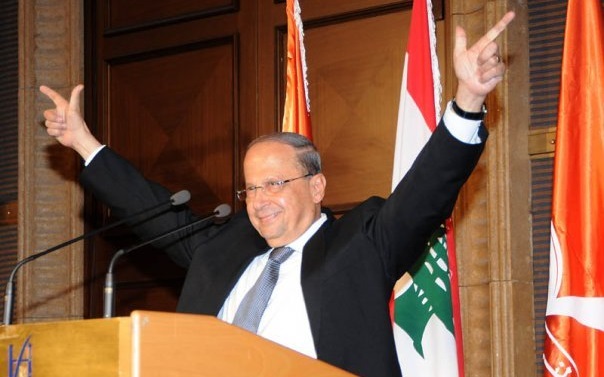[Photo: Imadmhj/Wikimedia]
On October 31, Lebanon finally selected a president, after 29 months of political deadlock and 45 failed attempts by the Lebanese parliament to choose a leader. The new president, Michel Aoun, is a former army commander and the leader of the centrist Free Patriotic Movement, and has promised to make major reforms in the troubled country.
Political deadlock between Lebanon’s March 8th coalition, led by Aoun and his Hezbollah partners, and their March 14th rivals, led by Future Movement leader Saad Hariri and Samir Geagea’s Lebanese Forces, had prevented the selection of a president since May 2014.
The election delighted Aoun, who has been eyeing the presidential palace in Baabda since his return to Lebanon in 2005 following a 15-year exile. Aoun is known affectionately by his supporters as the General, a throwback to his famed “War of Liberation” against Syrian forces in Lebanon during the nation’s civil war. When the war ended in 1990, Aoun found himself on the losing side, and was exiled until Syrian President Bashar al-Assad withdrew Syrian forces from Lebanon following mass protests in 2005.
Syrian spillover
Since his return, Aoun has developed a reputation as something of a political maverick, aligning himself with Hezbollah and warming to the Syrian government, often butting heads with the pro-Western, anti-Syrian March 14th Coalition. As Aoun takes his long-awaited seat in Baabda, he faces extraordinary challenges: an influx of over 1.5 million Syrian refugees, rising discontent over public corruption, and shifting political allegiances threaten to shatter Lebanon’s tenuous peace.
The Syrian civil war has thrust Lebanon into political and economic turmoil. Refugees have flooded into Lebanon, whose native population is only 4 million, quickly overwhelming state resources. To make matters worse, divisions between pro- and anti-Assad factions heightened tensions between Lebanese Sunnis and Shiites, with refugees often scapegoated for Lebanon’s political deadlock. Aoun has taken a decidedly tough stance on the Syrian refugee issue, warning that they pose a security threat and calling for their return to Syria. In his first address to the Lebanese Parliament, he called for an “independent foreign policy” that ensures a “quick return” for the Syrian population.
The refugee crisis may indeed pose an existential threat to the Lebanese state, threatening to upset its delicate sectarian balance and slowing the nation’s economic growth. However, with the Syrian war still far from over, the speedy return of its refugees is an impossible proposal. There is real concern that Aoun’s rhetoric will only exacerbate tensions between Lebanese and Syrians, especially given the pressure that Syrian refugees have placed on Lebanon’s economy. Aoun will have to walk a fine line between his plan for the Syrians and his desire to maintain an environment that is secure for tourists and investors alike.
Corruption and collapsing coalitions
Lebanon’s new president also faces significant barriers to his plans to root out government corruption. In 2015, protests over the Lebanese government’s handling of a garbage collection crisis morphed into a broader movement against inept bureaucrats and deep-rooted corruption. Tens of thousands of people poured into the streets of Beirut as part of the “You Stink” movement to demand change.
Although the movement failed to achieve tangible reform, it highlighted growing discontent among Lebanese youth in the face of rampant corruption. Bribery and favoritism handicap small business owners and further encourage Lebanon’s brain drain to Europe and North America, pushing the issue to the top of Mr. Aoun’s agenda. However, Lebanon’s corruption issues have deep structural roots; the government’s unique power-sharing rules and religious quotas encourage patronage and back-room deals between politicians and their constituencies. Political leaders have a dual loyalty: both to those who keep them in power, as well as to the broader Lebanese society. Aoun has provided little detail as to how he will address these underlying structural issues, making the future for reform unclear.
Aoun’s presidency also comes at a time of great change in Lebanon’s fragile political coalitions. His own election was only made possible when political rivals Samir Geagea, himself a former candidate for the presidency, and Saad Hariri, the Sunni Muslim heir to his father’s political and business empire, threw their support behind Aoun. Their surprise endorsement was just another twist in Lebanon’s rapidly evolving political story, particularly given Aoun’s steadfast alliance with Hezbollah and its leader, Hassan Nasrallah.
Aoun’s election leaves Hezbollah in an interesting position, particularly as its intervention in Syria on behalf of President Assad continues to grow. Hariri has since ascended to the Lebanese premiership, forming a government featuring a balance of March 8th and March 14th ministers. Hariri and Hezbollah are bitterly opposed over the latter’s intervention in Syria, as well as its continued ability to hold arms, a condition that Hariri considers an affront to Lebanese democracy and political stability. A warming relationship between the new prime minister and Aoun could see Hezbollah lose one of its fiercest critics, allowing it to continue its fight in Syria with reduced domestic pushback. This further comes at a time where the March 8th and March 14th coalitions appear to be fraying, affording Hezbollah opportunity to forge new political alliances with the backing of the president.
The Aoun-Hariri alliance may well signify the end of the rival blocs that have dominated Lebanese politics for the last decade. There is hope that the new unity government could calm political tensions and begin to make much-needed reforms.
But as Lebanon looks to the future, its leaders remain connected to a violent past. There is no question that Aoun is very much a part of the status quo, the same well of leaders going back to the civil war. It remains to be seen whether he will be able to rise above past transgressions and deliver on his lofty promises. What is clear is that for the first time in more than two years, Lebanon has at least a semblance of direction for the future.

